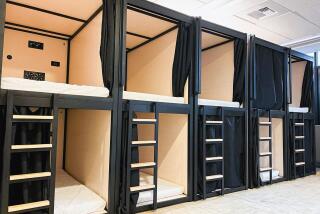U.S., Japanese Firms Will Jointly Build Housing Development in Escondido
- Share via
Housing developer Leisure Technology announced Wednesday that it has entered into a partnership with Tokyo-based Hazama USA Corp. and a consortium of three other Japanese contractors to develop an adult community in Escondido.
The development is one of several housing projects recently taken on by Japanese contractors, said Kenichi Iwao, preconstruction manager at Hazama, which has its U.S. headquarters in Los Angeles. The Escondido deal is the second housing project Hazama has entered into since it began doing business in the United States in 1984.
Hazama, a subsidiary of Tokyo-based Hazama Corp., has since become involved in 15 development projects, including office and industrial buildings and hotels. But the Escondido venture and a project in Long Beach, on which construction is to begin in May, are Hazama’s first housing ventures.
Ground breaking on the first phase of the 525-unit Escondido project, called Leisure Oaks Escondido, is scheduled in June and will include 175 single-family, detached homes for people 55 and older.
The project will be similar to but smaller than Leisure Technology’s 1,650-unit Ocean Hills development in Oceanside. It will feature a 17,000-square-foot recreation center, a nine-hole golf course, a junior Olympic swimming pool, tennis courts and a neighborhood clubhouse.
The development, in the Jesmond Dene area in north Escondido, has been challenged by slow-growth advocates in the city for 4 1/2 years, and has yet to receive final approval from the City Council. Although the project has been scaled down from its original 765 units, the council is still suggesting significant revisions.
Among the objections raised by council members was the age restriction, with one council member objecting to the “graying” of the community.
Iwao said Hazama and other Japanese contractors are exploring real estate investments other than office buildings and hotels because of the economic conditions in the United States.
“In the downtown areas, especially in Los Angeles, there is an oversupply of office space. (Demand) is not growing at this moment, and people are not looking to expand into the offices and move into new buildings,” Iwao said. “Also, there is too much risk involved in the hotel business.”
The housing market, however, despite the recently flat sales in Southern California homes, provides a much brighter outlook for development because of projected continued population growth, he said.
“In the housing market, the growth ratio is much higher, especially in Southern California due to the Pacific Rim tie-in. We expect a lot of the Japanese and Asians coming to this market as well, as the Eastern people moving in,” Iwao said.
Iwao pointed out that Hazama’s joint venture with Leisure Technology is neither the first nor the largest housing venture by Japanese firms.
The Takamaka Corp. has already begun building in Palm Springs, and Kajima, one of the largest Japanese contracting firms, has a residential project under way in Las Vegas, Iwao said.
He said that, although housing prices in some parts of Southern California have increased substantially, houses in inland areas and the San Diego area are more affordable.
Hazama USA is the lead Japanese investor in the project, with 23% equity interest. Other investors include Starts International California, Matsukyu USA and N. Hasegawa. Los Angeles-based Leisure Technology, which will retain a 50% equity interest, is the largest nationwide developer of “active adult” retirement communities.
Chief Financial Officer John Kilduff estimated that revenues from the 525-unit venture will reach $200 million over five years, but said he could not quote the cost of the project, only that it will be “something less than” the projected revenue. Prices for the houses have not been released.
The five-year project is the second venture Leisure Technology has engaged in with Japanese firms. Last March, the firm entered a $71-million joint venture with Nisshin Steel Co. to develop 44 full-service retirement communities over the next 15 years, including the expansion of Leisure Technology’s Ocean Hills development in Oceanside.
“We had made a strategic decision that, if the company was to grow in the future, one of the ways to do it was to go into joint ventures,” Kilduff said. “We were introduced to Hazama, and there was a commonality of interests. We have been and continue to be very impressed with their local management.”
More to Read
Inside the business of entertainment
The Wide Shot brings you news, analysis and insights on everything from streaming wars to production — and what it all means for the future.
You may occasionally receive promotional content from the Los Angeles Times.










